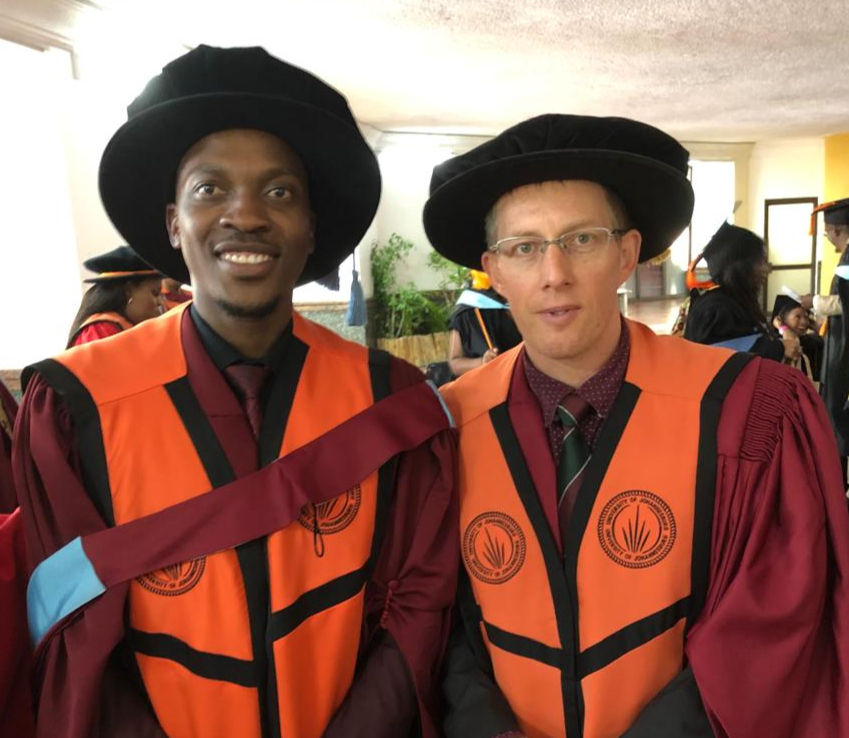The beauty of mentoring and sharing knowledge
- Andrew Hartnack
- Mar 29, 2025
- 3 min read
While much of my time is spent conducting applied research and evaluations, I also find great value in teaching, mentoring and research supervision.
Teaching in tricky times
Over the years, I have lectured large undergraduate classes at Stellenbosch University and the University of Johannesburg (UJ). Most recently, in 2020, I lectured a third-year development studies course to about 500 first-year students during the COVID-19 pandemic. This term-long course kicked off during the first lockdown in March. It was the first time universities were forced to switch abruptly to online learning, a difficult shift for both lecturers and students!
Many UJ students were navigating lockdown in difficult circumstances. Some were living in Joburg townships, others had returned to their rural homes. With minimal access to devices, data, internet or even electricity, they really struggled to adapt to online learning. From Cape Town, I had to record and upload lectures so that students who couldn’t attend live lectures could still access them. I held weekly chatroom sessions to answer questions, while the tutors also offered online tutorials. As expected, attendance at these was underwhelming. Although it was not an experience I enjoyed, it gave me valuable insight into the realities of undergrad students during the pandemic.
PhD supervision from afar
Around the same time, I was approached by Professor David Moore, a Canadian political scientist who specialised in Zimbabwe, to supervise Simon Murenga, a doctoral candidate at UJ. Simon was studying Zimbabwean farm-worker displacements in his homeland – the topic of my own academic research. With David as co-supervisor, I was keen to apply the excellent supervision and mentoring model I had experienced at UCT with Fiona Ross. Intrigued by Simon’s topic, I also saw immediately that this was a way for me to contribute to further research about Zimbabwean farm workers without conducting new fieldwork myself. I knew that Simon would be able to explore locations and issues which I had not, providing further insight to update and corroborate my own findings.

Fast-forward to 2024 and Simon, under my guidance, had completed a few stints of fieldwork, gathered some very interesting ethnographic insight, and drafted his thesis. Not coming from an anthropological background himself, I had coached him through a more ethnographic research focus and method, which worked well in the end. The most remarkable aspect of our supervisory relationship was that Simon and I never met in person throughout the four years – we communicated entirely via WhatsApp and email with a handful of Zoom meetings, me in Cape Town, him in Johannesburg. Fortunately, Simon was quite self-directed and also receptive to feedback, and our partnership proved to be a success. We met for the first time at his graduation in March 2025, a happy and interesting day. It was striking at the ceremony how feminised higher education has become, certainly in the humanities. Of the several hundred young graduates present, only around 10 percent were men, and many of them, like Simon, were not South African.
I did eventually receive a small sum for my role, but the real reward has been watching Simon develop into a fine young scholar who should soon also become an author. We also plan to publish a collaborative journal article combining insights from my two stints of fieldwork in the 2000s and 2010s with his recent research in the 2020s.
Training practitioners in applied research
Beyond academia, I have also been able to share my expertise in applied research through training workshops. In March 2025, the Bumb’INGOMSO initiative, a multi-faceted HIV-prevention project of the DG Murray Trust, approached me to train their staff and partner organisations in basic social science research skills. Bumb’INGOMSO, which focusses on young women in the East London/Buffalo City area, wanted to document its own impact but were unsure how to approach this exercise effectively.

I designed and facilitated a one-day interactive workshop, which was very well-received by the 20 participants. Together, we refined their tools and research questions, and I was able to share practical knowledge about how to design the process. What was satisfying was not only to harness the passion and existing knowledge in the room, but also to build the participants’ capacity and confidence to take ownership of their research process. This will hopefully enhance their impact on the communities they serve.
These experiences of lecturing, supervising and hands-on training reinforce the value of mentorship and sharing knowledge. I look forward to continuing to teach, guide, and collaborate with both scholars and practitioners in meaningful ways.




Comments